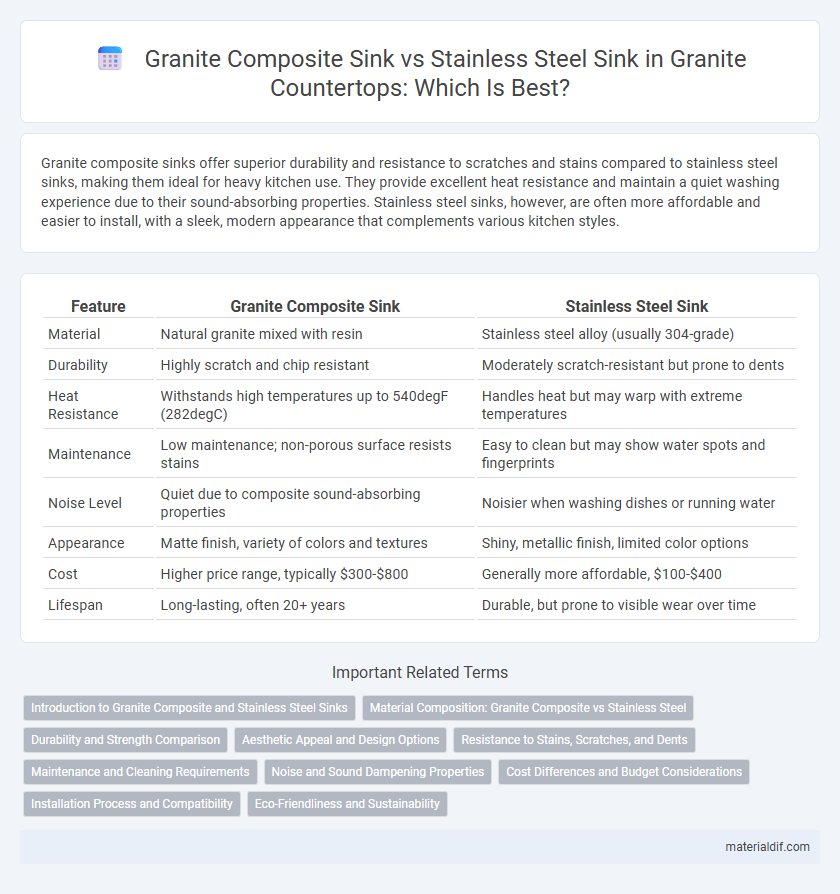Granite composite sinks offer superior durability and resistance to scratches and stains compared to stainless steel sinks, making them ideal for heavy kitchen use. They provide excellent heat resistance and maintain a quiet washing experience due to their sound-absorbing properties. Stainless steel sinks, however, are often more affordable and easier to install, with a sleek, modern appearance that complements various kitchen styles.
Table of Comparison
| Feature | Granite Composite Sink | Stainless Steel Sink |
|---|---|---|
| Material | Natural granite mixed with resin | Stainless steel alloy (usually 304-grade) |
| Durability | Highly scratch and chip resistant | Moderately scratch-resistant but prone to dents |
| Heat Resistance | Withstands high temperatures up to 540degF (282degC) | Handles heat but may warp with extreme temperatures |
| Maintenance | Low maintenance; non-porous surface resists stains | Easy to clean but may show water spots and fingerprints |
| Noise Level | Quiet due to composite sound-absorbing properties | Noisier when washing dishes or running water |
| Appearance | Matte finish, variety of colors and textures | Shiny, metallic finish, limited color options |
| Cost | Higher price range, typically $300-$800 | Generally more affordable, $100-$400 |
| Lifespan | Long-lasting, often 20+ years | Durable, but prone to visible wear over time |
Introduction to Granite Composite and Stainless Steel Sinks
Granite composite sinks are engineered using a blend of crushed granite stone and resin, providing exceptional durability, heat resistance, and scratch resistance while maintaining an elegant appearance. Stainless steel sinks, crafted from high-grade steel alloys, offer excellent corrosion resistance, ease of cleaning, and affordability, making them a popular choice in both residential and commercial kitchens. Both sink types vary significantly in texture, maintenance requirements, and noise levels, influencing their suitability for different kitchen environments.
Material Composition: Granite Composite vs Stainless Steel
Granite composite sinks are composed of a mixture of crushed natural granite and acrylic resins, providing exceptional durability, scratch resistance, and heat resistance. Stainless steel sinks are made from varying grades of steel alloy, often 304 or 316, with chromium content that ensures corrosion resistance and a sleek, modern appearance. The granite composite material offers a heavier, sturdier feel compared to the lightweight and noise-dampening properties typical of high-grade stainless steel sinks.
Durability and Strength Comparison
Granite composite sinks are known for exceptional durability, resisting scratches, chips, and heat better than stainless steel sinks, which can dent and scratch more easily. Stainless steel sinks offer strength with high corrosion resistance and a lightweight design but tend to show wear and tear quicker under heavy use. Overall, granite composite excels in long-term resilience and structural integrity, making it a preferred choice for heavy-duty kitchen environments.
Aesthetic Appeal and Design Options
Granite composite sinks offer a natural, stone-like texture with rich color variations that enhance kitchen aesthetics and provide a modern, sophisticated look. Stainless steel sinks feature a sleek, metallic finish that complements contemporary and industrial kitchen designs, available in various gauges and styles for customizable options. Both materials provide diverse design choices, but granite composite sinks tend to deliver a warmer, more tactile appeal compared to the reflective, high-shine surface of stainless steel.
Resistance to Stains, Scratches, and Dents
Granite composite sinks offer superior resistance to stains, scratches, and dents due to their dense, non-porous surface reinforced with natural stone and resin. Stainless steel sinks, while durable and resistant to dents, are more prone to visible scratches and water spots over time. The high hardness and integrated color of granite composite sinks maintain their sleek appearance, making them ideal for heavy kitchen use.
Maintenance and Cleaning Requirements
Granite composite sinks require gentle, non-abrasive cleaners and regular wiping to prevent stains and maintain their matte finish, while stainless steel sinks can tolerate harsher cleaning agents and scrubbing without damage. Granite sinks resist scratches but are prone to discoloration from acidic substances, necessitating prompt cleaning, whereas stainless steel sinks are less susceptible to staining but may show water spots and fingerprints. Both sink types benefit from routine cleaning, but granite composite demands more careful maintenance to preserve its appearance and durability.
Noise and Sound Dampening Properties
Granite composite sinks feature superior noise reduction due to their dense, non-metallic composition that effectively absorbs sound from running water and clattering dishes. Stainless steel sinks often require additional undercoating or sound-deadening pads to minimize noise caused by impact and water flow against the metal surface. Homeowners seeking a quieter kitchen environment typically prefer granite composite sinks for their naturally enhanced sound dampening properties.
Cost Differences and Budget Considerations
Granite composite sinks typically range from $300 to $700, offering a durable and scratch-resistant option that fits mid to high-end budgets. Stainless steel sinks are generally more affordable, priced between $100 and $400, making them ideal for cost-conscious consumers seeking a lightweight and corrosion-resistant solution. Budget considerations should include installation complexity and long-term maintenance, with granite sinks potentially incurring higher upfront costs but providing greater durability over time.
Installation Process and Compatibility
Granite composite sinks require careful handling due to their heavier weight, often necessitating reinforced cabinetry and professional installation to ensure proper support and prevent damage. Stainless steel sinks are lighter and compatible with most standard cabinets, allowing easier and quicker installation without additional structural modifications. Compatibility with various countertop materials is broad for stainless steel, while granite composite sinks pair best with solid surface and stone countertops to maintain durability and aesthetic cohesion.
Eco-Friendliness and Sustainability
Granite composite sinks offer enhanced sustainability due to their use of natural stone minerals combined with resin, reducing reliance on pure metal extraction processes that impact the environment. Stainless steel sinks, while durable and recyclable, often involve high energy consumption and significant carbon emissions during metal processing and manufacturing. Choosing granite composite sinks contributes to eco-friendliness by utilizing more sustainable natural materials and promoting longer product life cycles, thereby minimizing waste and resource depletion.
Granite Composite Sink vs Stainless Steel Sink Infographic

 materialdif.com
materialdif.com